#james mchenry
Explore tagged Tumblr posts
Text
#historical hamilton#amrev#Washington's aides#American Revolution#American Revolutionary War#Historical John Laurens#historical Alexander Hamilton#Historical Lafayette#John Laurens#Lafayette#Alexander Hamilton#John Fitzgerald#Joseph Reed#James Mchenry#George Washington#tench tilghman#richard kidder meade
72 notes
·
View notes
Text





My fav found family
#amrev#amrev fanart#hamilton#historical hamilton#george washington#martha washington#robert hanson harrison#tench tilghman#richard kidder meade#james mchenry#john laurens#marquis de lafayette#alexander hamilton
94 notes
·
View notes
Text
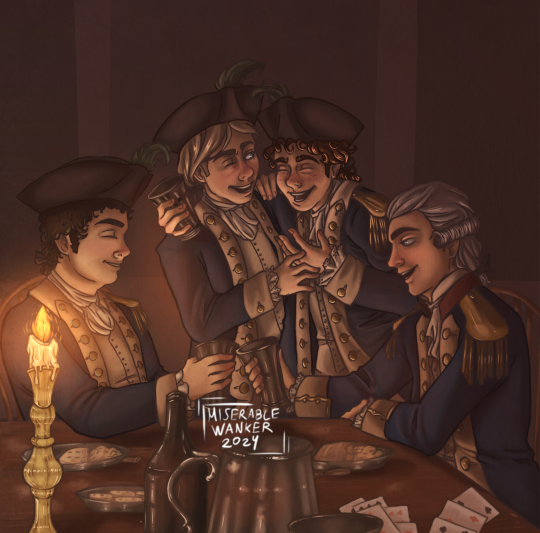
Come, let us drink it while we have breath,
For there's no drinking after death.
-
General Lafayette and Washington's drunken aides (Hamilton, Laurens and McHenry) after the Battle of Monmouth
#my art#amrev#alexander hamilton#american revolution#hamilton fanart#hamilton fandom#historical hamilton#hamilton#amrev fandom#historical john laurens#historical lams#lams#hamilton lams#marquis de lafayette#lafayette#historical lafayette#james mchenry
249 notes
·
View notes
Text

I'm sure he'll be fine
#king of saying vaguely concerning shit#we're tagging everyone left to right lets go#tench tilghman#Robert Hanson Harrison#richard kidder meade#marquis de lafayette#james mchenry#john laurens#alexander hamilton#amrev#washington's aides#art tag
350 notes
·
View notes
Text
An extensive list of the sources I have found on Internet Archive
Last updated 6/8/25
It would be quite selfish of me to keep these to myself, wouldn't it? This list will be updated frequently, in accordance to what I have found. These were found while doing my own research for various topics, and taken from the bibliographies of many books. Some of these I will have cited in posts of mine, many others will not appear anywhere in my work. Mostly primary sources, but quite a few books make their appearance.
Sorted alphabetically by surname of author
*Some sources, for the sake of readability, have their title somewhat shortened and/or authors removed. In this case, the sourced author will be chosen according to reverse alphabetization, as this is how they are listed on the Archive
A
Alden, John Richard. General Gage in America: Being Principally a History of his Role in the American Revolution
Anburey, Thomas. With Burgoyne to Quebec; An Account of the Life at Quebec and of the Famous Battle at Saratoga
Atwood, Rodney. The Hessians: Mercenaries From Hessen-Kassel in the American Revolution
B
Balderston, Marion and Syrett, David. The Lost War: Letters From British Officers During the American Revolution
Bass, Robert D. The Green Dragoon
Burr, Aaron. Memoirs of
C
Clinton, George. Public Papers of Volume 1 Volume 2 Volume 3 Volume 4 Volume 5 Volume 6 Volume 7 Volume 8 Volume 9 Volume 10
Clinton, Henry. Observations on Some Parts of the Answer of Earl Cornwallis to Sir Henry Clinton's Narrative Clinton, Henry. The American Rebellion; Sir Henry Clinton's Narrative of His Campaigns, 1775-1782
Commanger, Henry Steele. Spirit of '76: The Story of The American Revolution as Told by Participants
E
Ewald, Johann von. Diary of the American War: A Hessian Journal
G
Grant, Alfred. Our American Brethren: A History of Letters in the British Press During the American Revolution, 1775-1781
H
Hamilton, Alexander. Papers of Volume 5 Volume 8 Volume 9 Volume 10 Volume 12 Volume 13 Volume 15 Volume 16 Volume 18 Volume 19 Volume 22
K
Kapp, Friedrich. The Life of Frederick William von Steuben
Kemble, Stephen. Journal of
L
Laurens, Henry. Papers of Volume 1 Volume 2 Volume 3 Volume 4 Volume 7 Volume 8 Volume 11 Volume 12 Volume 13
Lefkowitz, Arthur S. George Washington's Indispensable Men
M
Massey, Gregory D. John Laurens and The American Revolution
Moultrie, William. Memoirs of
Murdoch, David H. Rebellion in America: A Contemporary British Viewpoint, 1765-1783
P
Parton, James. The Life and Times of Aaron Burr
R
Ramsay, David. The History of The Revolution of South Carolina
Robson, Eric. Letters From America, 1773 to 1780, Being the Letters of a Scots Officer, Sir James Murray, to his Home During the War of American Independence
S
Steiner, Bernard Christian. The Life and Correspondence of James McHenry
Stevens, Benjamin Franklin. The Campaign of Virginia, 1781: An Exact Reprint of Six rare Pamphlets on the Clinton-Cornwallis Controversy
T
Tarleton, Banastre. A History of The Campaigns of 1780 and 1781, in The Southern Provinces of North America
V
Van Doren, Carl. Secret History of the American Revolution: An Account of the Conspiracies of Benedict Arnold and Numerous Others
W
Ward, Christopher. The War of The Revolution
Washington, George. Papers of Agricultural papers
#writings#amrev#american revolution#alexander hamilton#john laurens#henry laurens#george washington#william moultrie#david ramsay#george clinton#baron von steuben#how many volumes does alexander have? dont worry about it#aaron burr#resources#banastre tarleton#james mchenry#thomas gage#john burgoyne#henry clinton#sir henry clinton#charles cornwallis#benedict arnold#hessian#hessians
124 notes
·
View notes
Text
hi i thought i’d dump post my lams art (laureloch, just laurens + jemmy, and washington aides art there too)
@nerenight ‘s washington aide one shot fic inspired art for the one with their writing in it and the sketch of hamilton asking if du ponceau wants to try on his glasses lololl!
oh my god i need to draw some of their other chapters, i personally think they capture the aides as a whole in my favorite way of all time (i can ramble for hours but well..)









#amrev#historical lams#lams#john laurens#historical john laurens#alexander hamilton#historical alexander hamilton#washingtonaides#richard kidder meade#robert hanson harrison#james mchenry#jemmy laurens#francis kinloch#laureloch#these arts are kind of old too oops
109 notes
·
View notes
Text
Hugo Lowell at The Guardian:
The US justice department fired more than a dozen prosecutors who worked on the criminal cases against Donald Trump hours after the president directly ordered it from the Oval Office, according to two people familiar with the intervention. The move to purge people who worked for former special counsel Jack Smith had ostensibly come from the acting attorney general, James McHenry, who sent the formal termination notices that said they could not be trusted to implement Trump’s agenda. But the genesis for the firings was Trump himself, the people said, in a demonstration of Trump’s unchecked power as he ushers in a new chapter for the justice department where it is directly answerable to the White House, a realm where past presidents have hesitated to tread.
The end goal of Trump’s team is for the president to have at his disposal a justice department that plays a leading role in enforcing his wishes and doing his bidding, under their version of a unitary executive, where the president directs every agency. Trump’s intervention to remove the prosecutors in Smith’s office was seen by some of his advisers as the start of their efforts to make it normal practice to have the attorney general work with the West Wing to enforce and enact its political agenda. The White House did not respond to a request for comment. After Trump instructed his advisers that he wanted the prosecutors gone, the White House presidential personnel office, led by longtime Trump ally Sergio Gor, issued a memo that directed the justice department to proceed and gave the move a degree of legal cover. The memo was then sent to the acting attorney general’s office, which issued the actual termination notices to those still at the department. The precise number is unclear because the department did not release names, but the trial team consisted of at least 18 lawyers. The justice department has gone through seismic change in the first days of Trump’s second term, with top officials demoted out of the deputy attorney general’s office and ousted from top positions in key components including the criminal, civil and national security divisions. Once the wider purges are completed, the expectation is for lawyers loyal to Trump to be installed in the vacancies. They could end up serving there for years, putting their own stamp on the department and transforming its future legal ideology to be aligned with Trump’s agenda. [...] The Trump White House then sent the memo to fire any remaining members of Smith’s team on Monday, a particularly aggressive move because they too were career prosecutors who in theory had civil service protections from being fired on political grounds.
The Guardian reports that Donald Trump personally ordered the firings of prosecutors who worked on the Jack Smith Special Counsel Investigations so that he can launch a power grab over the DOJ and turn it into his personal protection racket scheme.
#Donald Trump#Jack Smith#Jack Smith Special Counsel Investigation#James McHenry#US Department of Justice#Sergio Gor
25 notes
·
View notes
Text
#very important question i need to know who would get dogged on in the modern day#amrev#john laurens#alexander hamilton#richard kidder meade#tench tilghman#james mchenry#john fitzgerald#robert hanson harrison#joseph reed
36 notes
·
View notes
Text
Soldier, Poet, King- with the Aides!! :D

No Color Vers.
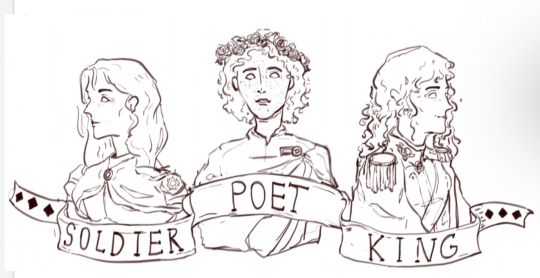
‘O Lai, ‘O Lei, ‘O Lai, ‘O Lord~
laurens n mchenry n harrison go brrrrrrr
#in order of appearance:#john laurens#james mchenry#robert hansen harrison#soldier poet king#art#my art#amrev au#amrev art#amrev#historical john laurens#poet mchenry time yesss#I didn’t know who to make the king so harrison it is :)#washington’s aides#the aides#aide de camps#aide de camp#ignore the scary eyes :0#alexander hamilton#historical alexander hamilton#american revolution#historical lams
63 notes
·
View notes
Text

You Sir, who are acquainted with me must be convinced that an apprehension of his, or any man’s resentment is a motive incapable of operating upon me ….
Hamilton, Alexander. “To James McHenry [26 February 1782],” Alexander Hamilton Papers: General Correspondence 1734-1804; 1782, Jan.-July, image 16, Library of Congress https://www.loc.gov/resource/mss24612.001_0651_0719/?sp=16&st=image.
It’s always fun when this man just drops his unfiltered opinions on his parchment. A plus is seeing the parchment itself. That is all.
#grace’s random ramble#TAI research#alexander hamilton#historical alexander hamilton#james mchenry#amrev#historical letters#historical research#library of congress#18th century history#18th century correspondence#historical documents#my research#my writing
3 notes
·
View notes
Text
So I might be watching too much Bones recently but what if we make up a police detective mystery with the Aide-de camps?
I sort of already have a vision. This is so far what I have:
For the protagonists we have Meade and Tilghman as a comedy duo
Washington is the head of the police station
McHenry is the forensic medicine expert
Hamilton is the bright youth of the team that everybody questions first if he is old enough for his position.
Laurens is the newish addition to the team (his role is depending on if we stay with irl timeline)
(Also yes, there is the secret office romance thing going on but if it's modern day, we can change the homophobia to no work realtionships allowed.)
Feel free to add more!
#amrev#american revolutionary war#amrev fandom#amrev au#alexander hamilton#john laurens#tench tilghman#richard kidder meade#james mchenry#george washington#lams#office comedy au#that is how I will call it#because they are silly#my sillies
18 notes
·
View notes
Text

Just a doodle of Washington's military fam in 1780
From left to right: Tilghman, Harrison, Washington in the back, Lafayette, Hamilton, McHenry, Meade. Also sorry if I forgot anybody lol
#amrev#amrev art#historical#historical alexander hamilton#alexander hamilton#tench tilghman#james mchenry#richard kidder meade#robert hanson harrison#marquis de lafayette#george washington
110 notes
·
View notes
Text
The friendship of Achilles for his dear Patroclus, as celebrated by Homer, has survived the fate of empires and the charges of time, as if destined to serve as a perpetual monument sacred to friendship. May not another Homer arise to consign yours for Fayette to equal immortality, and tears of pleasure flow at its recital like an exhaustless stream through the long period of future ages.
McHenry to Washington on April 3, 1794 on Lafayette's imprisonment. A few lines before he had told Washington to be sensible, assumingly with what little they could do. (So take that Cabinet Battle #2 Washington cared for Lafayette to the point of being told he had to be sensible. But helping in France wouldn't have freed him)
I very much need to sit with this quote for a few days but also. If I'm getting this right McHenry is saying that if Lafayette died in his prison, Washington's grief would be akin to Achilles' to Patroclus and stories would be written about it, immortalizing their friendship for ages to come, as he says "May not another" so they don't want this friendship to be immortalized similarly to Achilles+Pat because it means it ended sadly. (I may be off about my initial interpretation)
It's... Very sad. Like I can't imagine how heartbreaking it it to write this and pray for your friend's sake your other friend lives cause it's shaping up for a grief that will shape generations. (It's giving Alexander and Hephaestion and Alexander clinging to Phai's dead body for days until the companions had to drag him away)
I think of Hamilton and Laurens as that generation's A+P because Laurens died so early and Hamilton retreated into himself and buried himself in work to ignore his grief but we very much could've gotten a world where they executed Lafayette and he and Washington's friendship was immortalized with Homerian grief. Heck, Adrienne was a day away from being executed the following year and she did nothing wrong but be married to Lafayette.
I just... comparing people to Achilles and Patroclus is really telling. Even ignoring the romance part(idk what the 18th century take on those two and romance was. I could see, if one of them had heard of it, the gay trio supporting it.)
#george washington#marquis de lafayette#lafayette#washette#Mchenry was a very good egg though#james mchenry#I may be way off in my interpretations btw#but it's so sad#it must've been so hard#waiting for years#for either good news or the worst news#and what do you do if the worst news comes#what do they do-the ones who love george#how do you hold achilles together when he falls to dust#after years of anxiety
18 notes
·
View notes
Text
Doctor James McHenry for the burnout moodboard
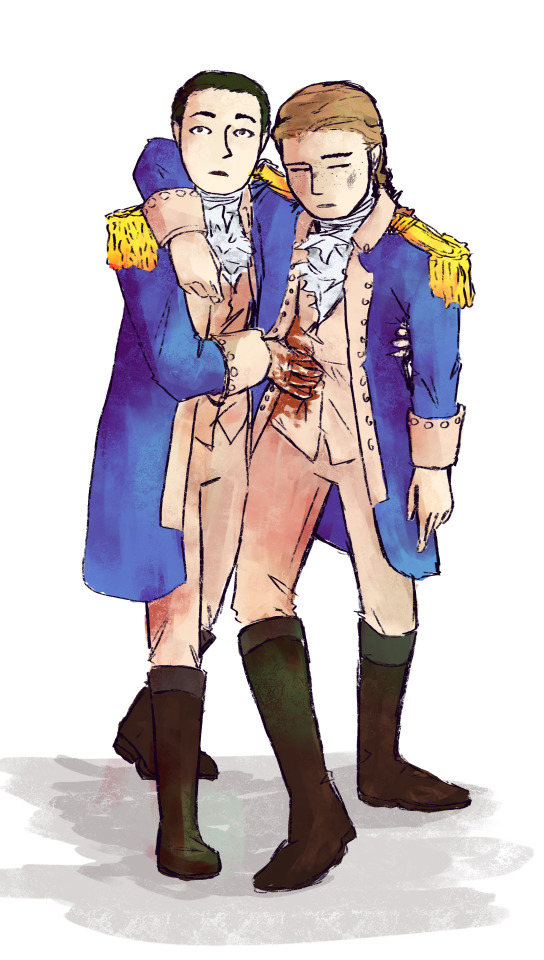
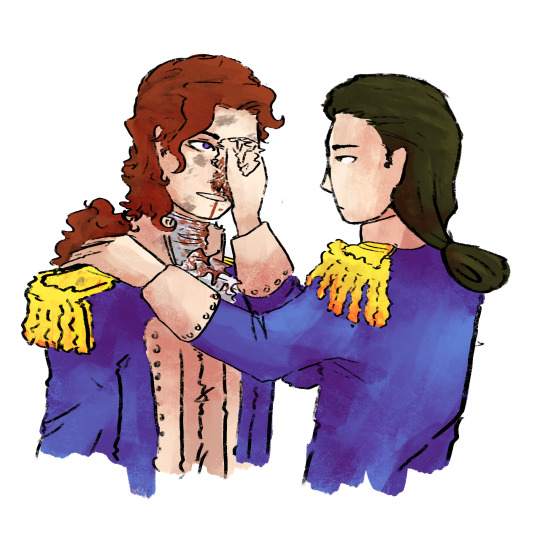

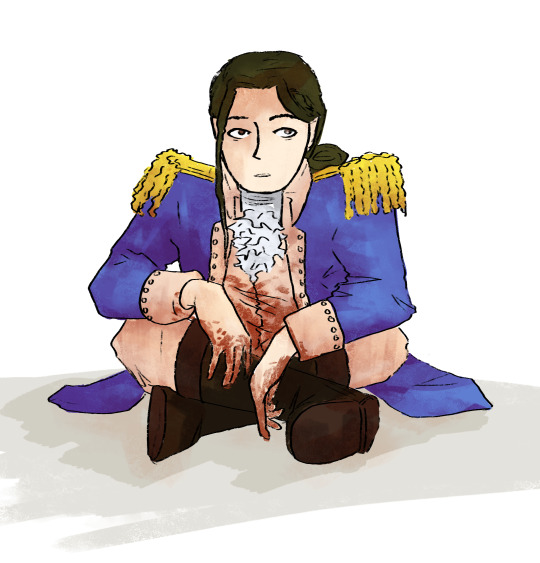
This is another reminder to go read @nerenight's fantastic fic which has very nearly single handedly carried my interest in these boys
#seriously its phenomenal and I wish I had the time to give it more than a few sketches#james mchenry#john fitzgerald#alexander hamilton#john laurens#amrev#art tag#I am now realizing I forgot the ribbands#well#My art can be inconsistent with people but mac is very round and friend shaped#and i love that for him
168 notes
·
View notes
Text
Miscellaneous misadventures of Washington's aide-de-camps
One of the many enduring tales surrounding our dear Richard Kidder Meade is an account of him climbing a chimney in order to read a letter. While this smacks of the misunderstanding of one not used to parsing the language of the 18th century, it is with great pleasure that I present this tale to be true.
In a letter dated to March 18, 1780, James McHenry writes the following to Alexander Hamilton:
Meade writes you all that is interesting, and conducts the most weighty matters with a great deal of cunning sagacity. He thrust himself up the chimney this morning, while we were dressing round the fire, in order to be more at liberty as I supposed to read your letter, or hide any thing it might contain, from profane eyes. This peculiarity was soon followed by another. In short, he managed the business with so much management, that had I been less attentive to his operations I must have found out their object.
Source
#writings#amrev#american revolution#james mchenry#alexander hamilton#richard kidder meade#miscellaneous misadventures#in short order this shall become a series! i have a few more in mind i shall be writing on shortly
7 notes
·
View notes
Text
Interview: James McHenry of Blind Equation (Video/Audio)
We spoke to cyber-grind band, Blind Equation about the new album 'Death Awaits', the process involved with creating it, being a 'marmite' band, playing live, and so much more.
Emotional cyber-grind band, Blind Equation, released their much-anticipated sophomore full-length album ‘Death Awaits’ on September 15th via Prosthetic Records. Here, Blind Equation plummets the depths of self-loathing, interpersonal betrayal, anxiety and death itself. A band that really can be called unique and a band likely to polarise in extreme ways. Part genius, part madness, all kinds of…

View On WordPress
0 notes